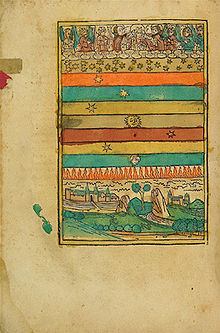- Konrad of Megenberg
-
Konrad of Megenberg (or Konrad von Megenberg and Konrad von Mengelberg[1]) (Latin: Conradus Megenbergensis) (1309–1374) was a German Catholic scholar, and a versatile writer.
Contents
Biography
Konrad was born probably at Mainberg, near Schweinfurt, or Mebenburg, both in Franconia now Bavaria, on 2 February 1309. The dates of birth and death are not absolutely certain, and Konrad himself calls his native place Megenberg. He studied at Erfurt and Paris; at the latter university he obtained the degree of Master of Arts, and he taught philosophy and theology there for several years.
In 1337 he was named head of St. Stephen's school at Vienna. From 1342 he lived at Regensburg, in Bavaria, where he was first a parish priest, proving himself to be an able preacher. Later he became a cathedral canon, and member of the town council. In 1357 he made a journey to the Papal Curia in 'Babylonian exile' at Avignon. He died at Ratisbon (and alternative name for Regensburg) on 11 April 1374.
Works
Konrad was one of the most prolific German writers of the fourteenth century. His best-known and most widely read work is his "Buch der Natur", which is still of importance for the history of culture. According to his own statement he was engaged in writing it in 1349. A Latin work, De naturis rerum, of the Dominican Thomas of Cantimpré (d. 1263), served as model. Konrad, however, prepared his book with considerable freedom; much of the original was omitted, his own observations were introduced, corrections were made, and so on. His work gives a survey of all that was known of natural history at that time and is, besides, the first natural history in the German language. It was widely read up to the sixteenth century, and numerous manuscript copies of it are still extant, eighteen being at Munich. The first printed edition with a date is of 1475, and was issued at Augsburg from the shop of Hans BŠmler, under the title of "Puch der Natur". It was printed at least six times before 1500; some of the editions were illustrated, all are now rare incunabula. A new edition of the original text was issued by Franz Pfeiffer (Stuttgart, 1861), with an introduction; an edition in modern German was edited by H. Schulz (Greifswald, 1897).
The work has 8 chapters
- the nature of man
- sky, 7 planets, astronomy and meteorology
- zoology
- ordinary and aromatic trees
- plants and vegetables
- invaluable and semi-precious stones
- 10 kinds of metals
- water and rivers.
Of Konrad's numerous other writings there should be mentioned:
- the "Sphære" 'Spheres', a small compendium in German of astronomy and physics, prepared from the Latin work of Joannes Sacrobosco
- some poems, including "Planctus ecclesiæ in Germania" (1337)
- a hymn in praise of the Virgin
- a work on morals, "Speculum felicitatis humanæ" 'mirror of human happiness' (1348)
- "De erroribus Begehardorum et Beguinarum" 'about the errors of Beghards and Beguines'
- "De translatione imperii" (1355) on the translatio imperii, i.e. 'succession' of empires
- the large work "Oeconomica", written between 1353 and 1363
- "Tractatus contra mendicantes ad Papam Urbanum V" 'treatise against mendicant (order)s addressed to Pope Urban V
- several biographies of saints
- some historical treatises, chiefly dealing with the local history of Ratisbon.
In his writings Konrad shows himself to be a strong adherent of the pope, an opponent of the philosophy of Occam, and a stern critic of the moral failings of his age and of the clergy.
References
- ^ "Die Litteratur der ersten hundert Jahre nach der Erfindung der Typographie" Christian Friedrich Harless
External links
- Johannes Madey (1992). Bautz, Traugott. ed (in German). Konrad of Megenberg. Biographisch-Bibliographisches Kirchenlexikon (BBKL). 4. Herzberg. cols. 423–425. ISBN 3-88309-038-7. http://www.bautz.de/bbkl/k/Konrad_v_me.shtml.
- Das buch der natur Digital version at the University of Heidelberg
- Insect illustration From the Tippmann collection at NCSU
- "Konrad of Megenberg". Catholic Encyclopedia. New York: Robert Appleton Company. 1913. http://www.newadvent.org/cathen/08691a.htm.
 This article incorporates text from a publication now in the public domain: Herbermann, Charles, ed (1913). Catholic Encyclopedia. Robert Appleton Company.Categories:
This article incorporates text from a publication now in the public domain: Herbermann, Charles, ed (1913). Catholic Encyclopedia. Robert Appleton Company.Categories:- 1309 births
- 1374 deaths
- People from the District of Roth
- German zoologists
- German naturalists
- German entomologists
- German writers
- Roman Catholic writers
Wikimedia Foundation. 2010.

